2024 Moving Insights Report
An inside look at how Americans are budgeting, (over)spending, and managing stress during the moving process.

An inside look at how Americans are budgeting, (over)spending, and managing stress during the moving process.

Who loves to move? Apparently, Gen Z is a big fan as over half (57%) of this generation find moving enjoyable. Baby boomers don’t agree though, as only 22% find moving to be enjoyable.
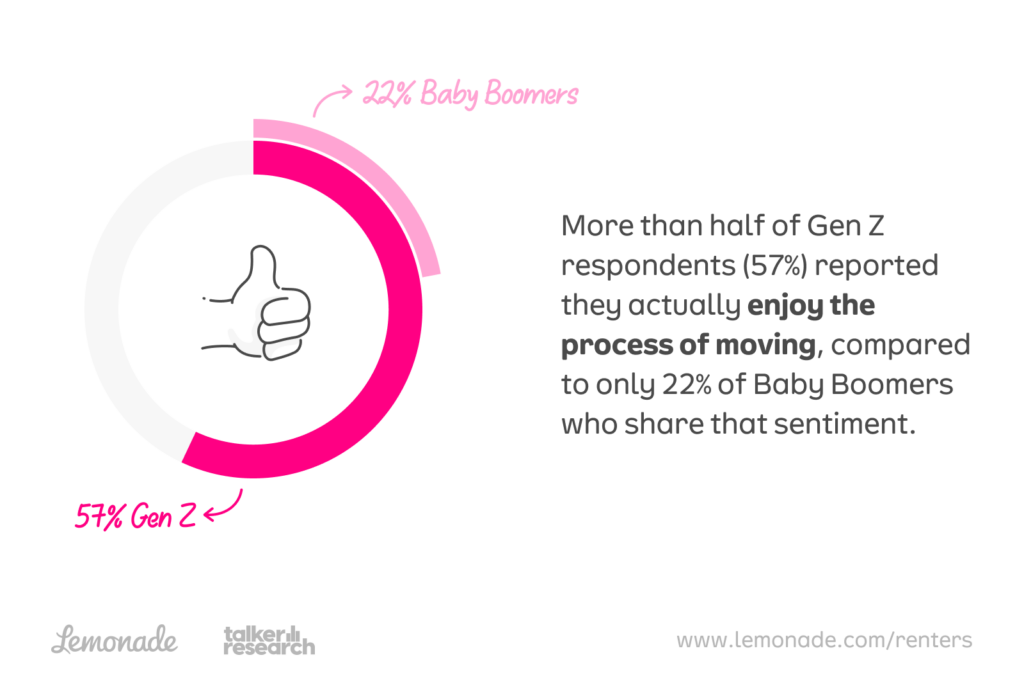
As the summer moving season heats up, Lemonade commissioned a survey, in collaboration with market research firm Talker Research, that asked 2,000 Americans who have moved in the last five years how they approach and experience moving (here’s more on the methodology).
Let’s take a look at how the moving process impacts Americans’ finances as well as their physical and emotional well-being.
From a personal finance perspective, budgeting habits vary significantly across generations. Gen Z stands out as the most meticulous planners, with 60% creating a moving budget. In contrast, 55% of millennials planned a budget, followed by 46% of Gen X, and only 38% of baby boomers.
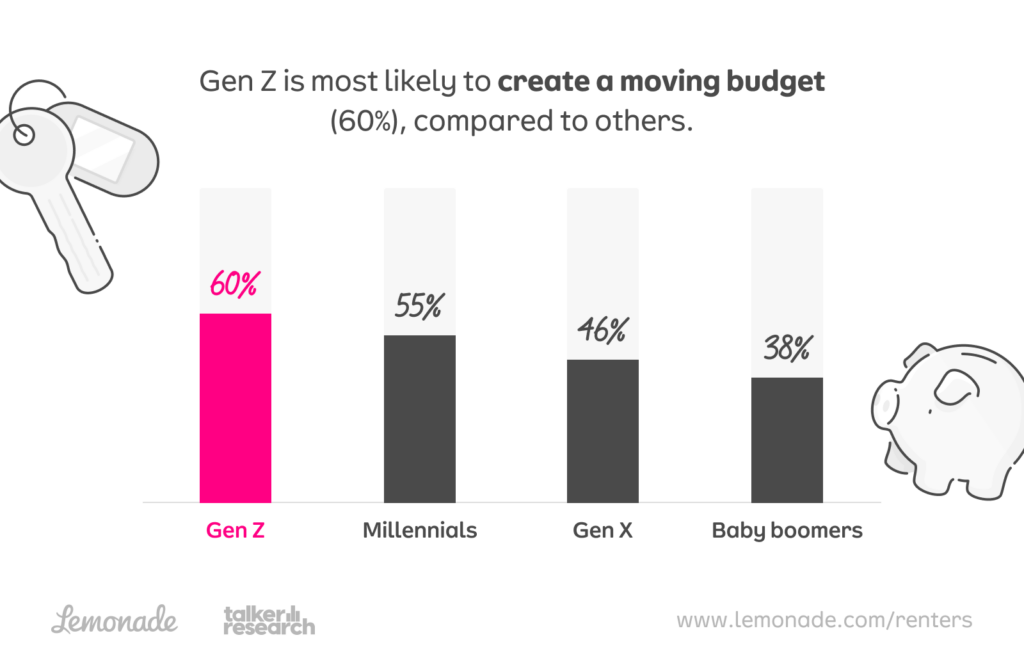
For their move, the average person budgeted:

Gen Z focused their budget on getting their new space ready with things like furniture and home updates ($1,703.50 on average), while baby boomers focused on the physical components, like moving trucks and supplies ($1,633.60 on average).
Despite their careful planning, 4 in 5 still find themselves exceeding their budgets by an average of $1,057.20. And for the average respondent, it took five months to financially recover from their most recent move.
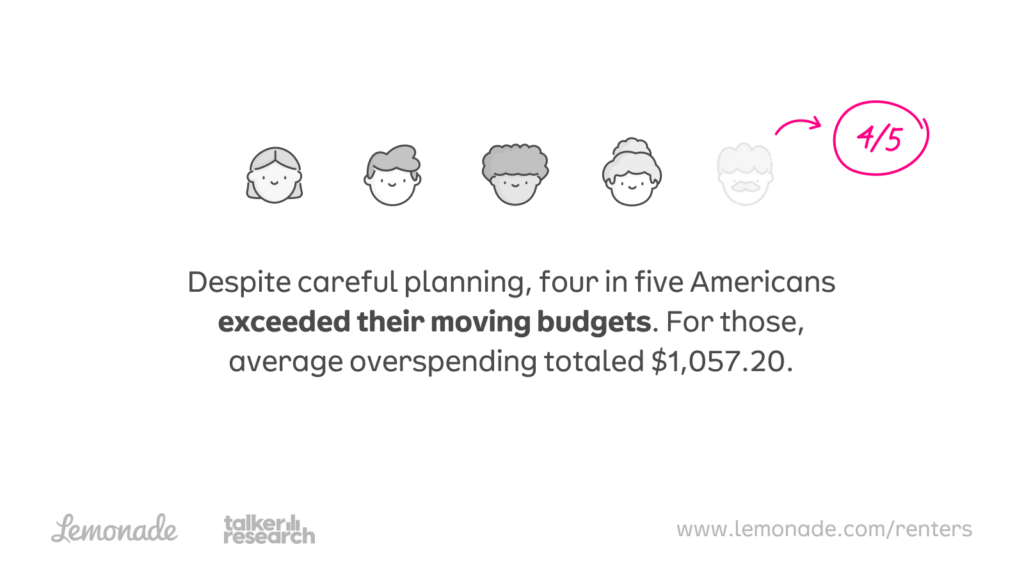
Of Americans who created a budget for their move, only 16% of respondents didn’t exceed their moving budget. Gen Z and millennials were more likely to exceed their moving budget compared to older generations. Only 12% of both Gen Z and millennial respondents didn’t exceed their moving budget, compared to 23% of Gen X and 30% of baby boomers. And nearly one in three (31%) Gen Z respondents exceeded their moving budget by more than $1,000, compared to 16% of baby boomers.


For 42% of respondents, it took more than three months to financially recover from their most recent move, with almost half (49%) of baby boomers taking more than 4 months to recover financially, compared to millennials (45%), Gen X (39%), and Gen Z (35%). And baby boomers were the most likely (14%) to take more than 13 months to financially recover after a move, compared to Gen Z (1%).


Still, nearly half (47%) said they would overpay if it meant they would have a disaster-free move, with millennial respondents being the most willing to overpay (51%), compared to baby boomers who were least willing to overpay (37%).
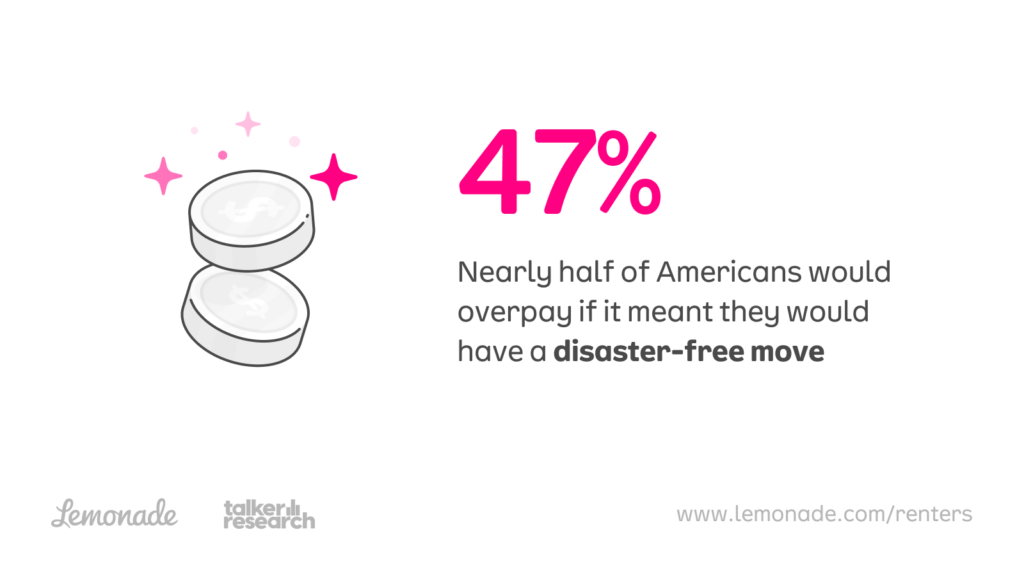
Whether you enjoy packing up your old house and moving into a new one or you hate the process altogether, it’s a huge undertaking with so many factors to think about: logistical, emotional and financial. And it’s very easy to forget important things. It’s always a good idea to simplify the process as much as possible, especially for those tasks we tend to forget, like updating your address, insurance and utilities accounts.
Sean Burgess, chief claims officer at Lemonade
According to those surveyed, the most unexpectedly expensive parts of moving were renting a moving truck (30%), purchasing packing materials (22%) and putting some belongings temporarily in storage (18%).
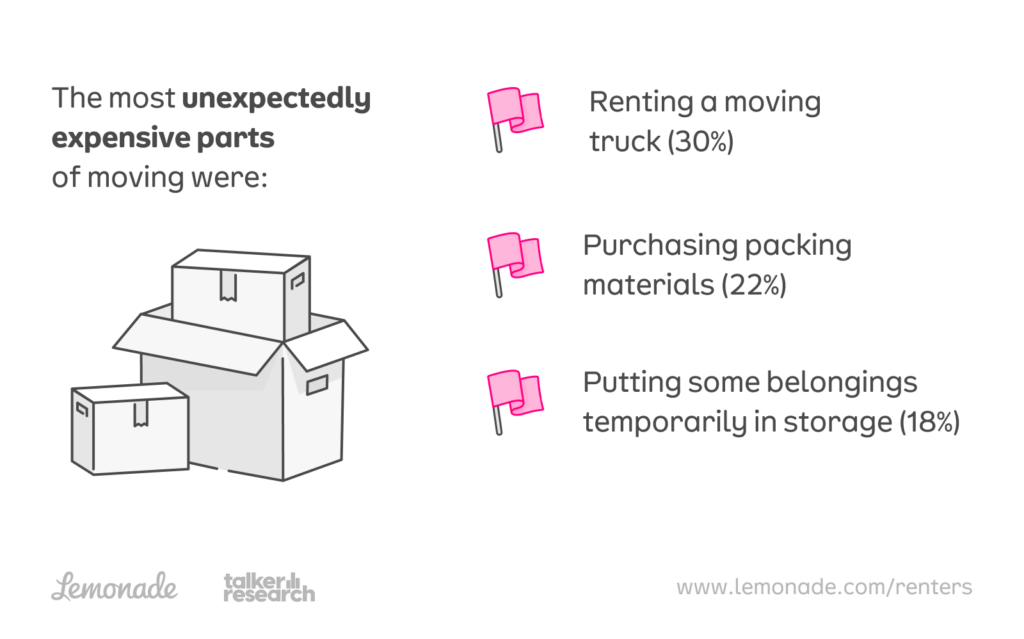
If respondents could go back and do it all over again, they would prioritize the following more in their budgets: Moving truck (34%), packing materials (28%), and a moving service (28%).
59% of respondents surveyed were looking to rent a home and 23% were looking to buy a home.
The most common reasons for moving included:
Americans have a lot of specifications—both what they do and don’t want—when hunting for their next home. For those looking to rent new homes when moving, the most alarming “red flags” included the home looked worse in person than in pictures (28%), lack of air conditioning (26%), hidden fees during the leasing process (26%) and worrisome lease terms (23%).
The biggest “green flags” when evaluating a home was air conditioning (34%), which proved to be critical for baby boomers with almost half (47%) citing it, as compared to only 28% of Gen Z. Other “green flags” included utilities included in the rent (30%), the home looked as great in person as it did in pictures (26%) and had up-to-date appliances (24%).
According to respondents, some of the top non-negotiable characteristics for a new home include a safe neighborhood, a pet-friendly space, central heating and air, and a yard.

For almost half (45%) of baby boomers living in a safe neighborhood was essential, compared to 31% of millennials and 33% of Gen Z.
When it comes to finding a home that’s near family, it was a priority for 29% of baby boomers, but was only a requirement for 18% of Gen Z and millennials, and 15% of Gen X. And another generational divide comes down to commuting, with 23% of Gen Z considering their commute to work a non-negotiable compared to only 5% of baby boomers.
To be a competitive candidate when looking to sign a new rental agreement, respondents recommend:
Interestingly, online presence plays a role for the younger generations—16% of Gen Z say renters should “review social media profiles to make sure their online reputation is appropriate” compared to only 9% of Boomers.
Nearly half of renters (45%) purchased renters insurance when moving.
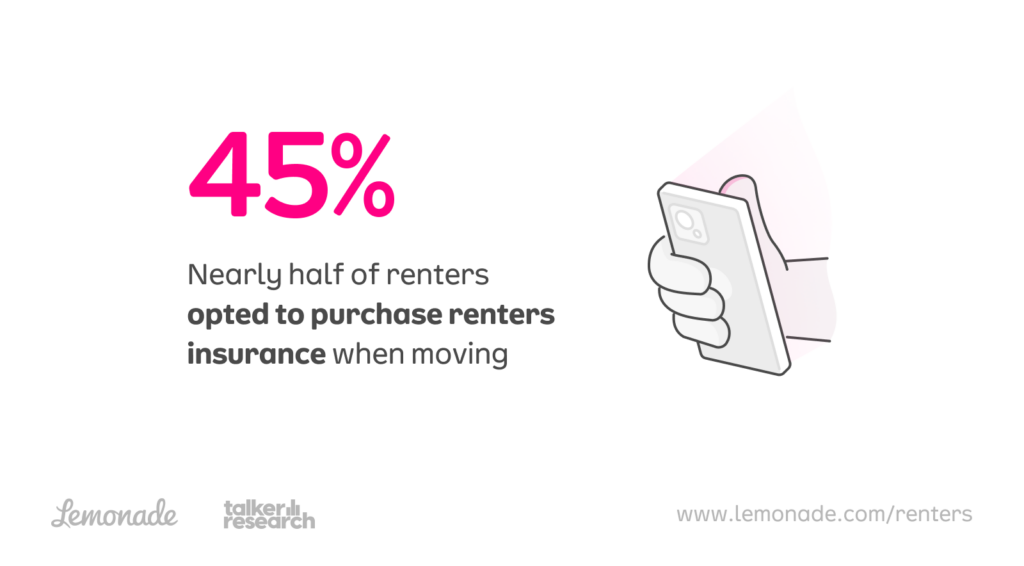
More than three in five Americans (60%) owned a pet during their move. More Gen Z (63%) and millennials (63%) owned pets during the move than Gen X (56%) and baby boomers (48%).
For those with a pet, the following aspects/characteristics were non-negotiable when looking for a new place to live:
Having a yard at their next place was most crucial to baby boomer pet parents (51%), and less of a requirement for Gen Z (35%).
Over half of those who were looking to rent (52%) said it was challenging to find a place that suited both their and their pet’s criteria.
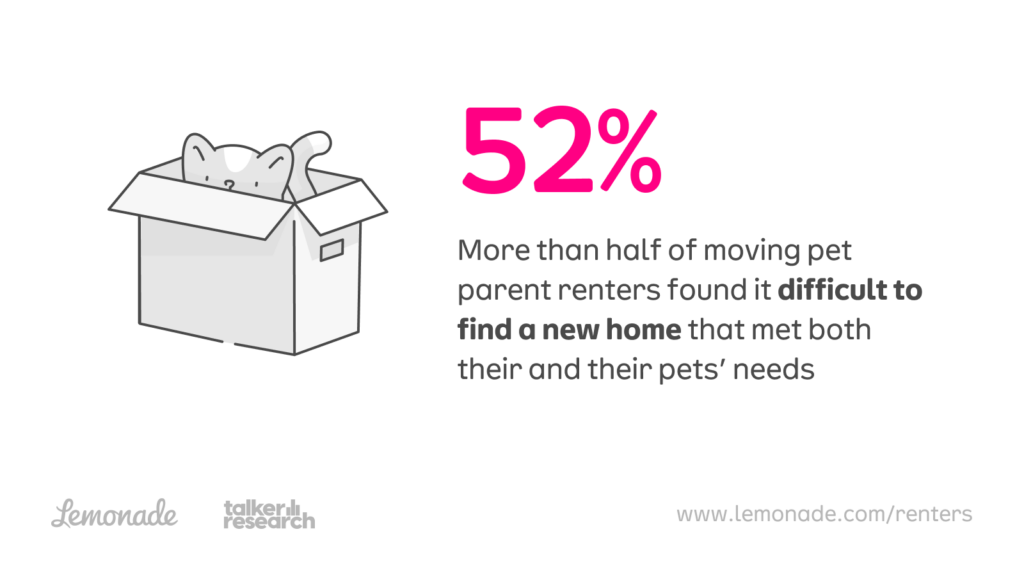
Nearly a quarter (23%) of respondents found that the amount of time and effort it takes to pack before the move is one of the most frustrating and stressful parts.
Almost half (48%) of respondents gave themselves two weeks or less to pack before their most recent move, while 63% believe the packing process should ideally start more than three weeks before moving day.
When it comes to being a bit forgetful, 35% claimed they didn’t forget anything, baby boomers being the least forgetful (58%) compared to Gen Z (24%). Some of the biggest gaps include updating their address or forwarding mail (31% of Gen Z forgot compared to 18% of baby boomers) and updating their renters insurance or home insurance (19% of Gen Z compared to only 3% of baby boomers).
Looking at the impact of moving on general wellness and self-care, the average American need three months to mentally and emotionally recover and two months to bounce back physically after moving, according to the survey.
According to the study, Gen Z took longer to physically recover (3.3 months) than Gen X (1.7 months) and baby boomers (2 months).
Respondents said the most stressful part of moving was the “overall chaos” (26%).
The stress of moving takes a toll on everyday habits. Our survey revealed people had poorer sleep (25%), cooked less (24%), snacked on more junk food (20%), and others felt low moods throughout the process (20%).

To make the moving experience more enjoyable, respondents said you should be fully prepared throughout the day (39%), invite friends to help out (35%), create a fun playlist (32%) and treat everyone to dinner at the end of the day (32%). As for the need for a little music, the need for a playlist increased to 40% of Gen Z respondents, compared to only 16% of baby boomers.
Moving homes is incredibly stressful, but the load can be lightened if you lean on those around you. Whether that’s your partner, friends, family, or even an insurance company, make sure to look out for those that can help simplify a very busy and potentially chaotic time.
Sean Burgess, chief claims officer at Lemonade
This random double-opt-in survey of 2,000 Americans who have moved in the last five years was commissioned by Lemonade between May 23 and May 29, 2024. It was conducted by market research company Talker Research, whose team members are members of the Market Research Society (MRS) and the European Society for Opinion and Marketing Research (ESOMAR).
Please note: Lemonade articles and other editorial content are meant for educational purposes only, and should not be relied upon instead of professional legal, insurance or financial advice. The content of these educational articles does not alter the terms, conditions, exclusions, or limitations of policies issued by Lemonade, which differ according to your state of residence. While we regularly review previously published content to ensure it is accurate and up-to-date, there may be instances in which legal conditions or policy details have changed since publication. Any hypothetical examples used in Lemonade editorial content are purely expositional. Hypothetical examples do not alter or bind Lemonade to any application of your insurance policy to the particular facts and circumstances of any actual claim.